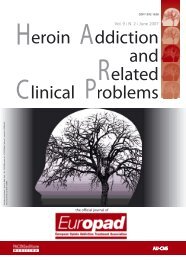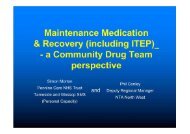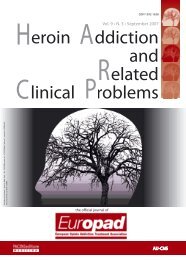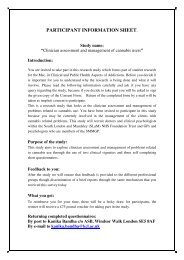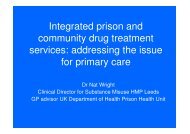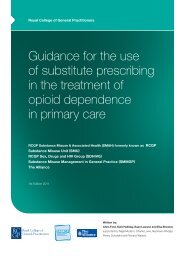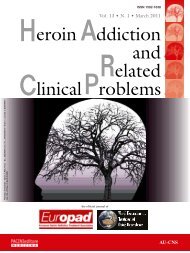cocaine guidance - Royal College of General Practitioners
cocaine guidance - Royal College of General Practitioners
cocaine guidance - Royal College of General Practitioners
- No tags were found...
You also want an ePaper? Increase the reach of your titles
YUMPU automatically turns print PDFs into web optimized ePapers that Google loves.
25Appendix 5Appendix 5Developing protocols for shared careMost Shared Care Schemes are set up to manage opioid users and rarely meet the needs <strong>of</strong> <strong>cocaine</strong> users, whereasmost drug users now use a combination <strong>of</strong> drugs. Schemes should be encouraged to meet the need <strong>of</strong> the individual,not a specific drug.Establishing clear protocols for this is important. They should aim to maximise your time with your patient and ensureeffective care and/or smooth onward referral mechanisms where appropriate. The protocols should range from whathappens when a <strong>cocaine</strong> user comes into your service, to good working relationships with other local services.The basic questions which you need to discuss before drawing up shared care protocols are: Why do we need them;who are they for; what should they contain and how to do it.Why do we need them?■ To promote access to care for all drug users, including<strong>cocaine</strong> users who are currently not accessingservices at the moment.■ <strong>General</strong> practice is the most accessible and availablepart <strong>of</strong> the NHS and therefore it seems obvious thatit should cater for <strong>cocaine</strong> users.■ Many methadone and other opiate substitute patientsare also using <strong>cocaine</strong> and this issue should beaddressed.■ Taking <strong>cocaine</strong> use on board in primary care can beempowering, and extend your service beyondbecoming just substitute therapy maintenance clinics.Who are they for?■ They should be aimed at the GP, drug workers andwider primary health care team.What should they contain?■ You will need to have clearly marked out roles andresponsibilities e.g. who does the hepatitis vaccinations,who does the harm reduction work and who doesthe Motivational Interviewing and CBT. This may ormay not turn out to be the GP.■ Develop locally agreed care pathways.The content <strong>of</strong> your protocols should seekto address the following issues:■ Promote a more accepting and understanding attitudewith some knowledge behind it.■ Engagement including retention and motivation forboth patient and clinician who have to work with adifficult problem.■ Patient education, for example, whether to use leaflets,posters and videos.How to do it – how to draw up <strong>cocaine</strong> protocols■ Services have to reflect local needs and therefore itis useful to undertake a local needs analysis.■ Must be grounded in best practice, using the availableevidence and not opinion.■ Must adapt to local arrangements, so consult widelywith your DATs and PCOs.■ Those responsible for clinical governance should havean understanding <strong>of</strong> what you are doing.■ Discuss with the primary care health team andincorporate suggestions and deal with concerns.■ Involve your local drug agencies at an early stage.■ Always consult and involve local user groups at thebeginning and right through the process.You will then need to amend and repeat the process <strong>of</strong>consultation. This should then be followed by disseminationand training <strong>of</strong> staff in the implementation <strong>of</strong> your newprotocols.Developing a training schemeYou could develop a training scheme in your local areathat includes specific training days for GPs and otherpractitioners, and specific training sessions for surgerystaff e.g. receptionists and other support staff. You couldinitiate a specialist mentors scheme to support your workand/or make contact with national crack specialists to<strong>of</strong>fer advice, <strong>guidance</strong> and update on any new research.Developing a payment schemePayment should be for caring for the patient, not thedrug they are taking or what you might be prescribing.This issue is going through a period <strong>of</strong> change at themoment with the evolution <strong>of</strong> the new GPs’ contract,and it is therefore a perfect time to establish improvedprotocols.■ All information should aim to promote harm reductionmessages and the protocols should illustrate how tomake fast and appropriate referrals.



